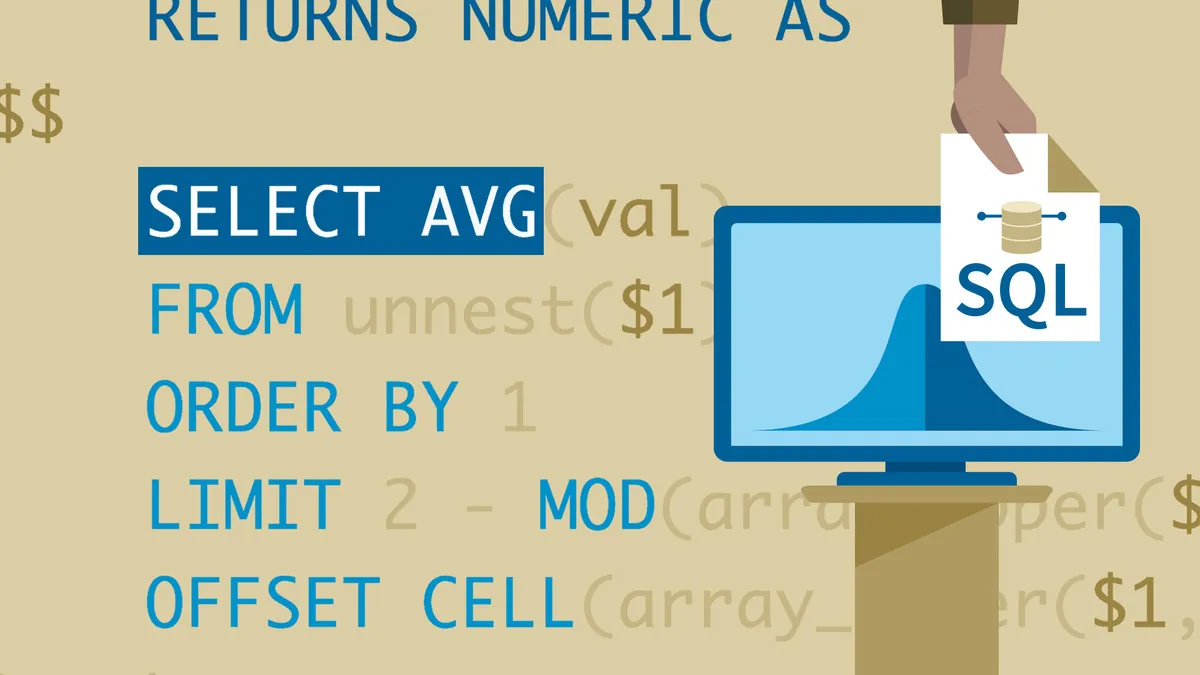
SQL for Exploratory Data Analysis Essential Training 
This course provides an introduction to using SQL for exploratory data analysis. Through hands-on exercises, learners will gain the skills to use SQL to explore and understand data sets, preparing them for data science and machine learning. ▼
ADVERTISEMENT
Course Feature
![]() Cost:
Cost:
Free Trial
![]() Provider:
Provider:
LinkedIn Learning
![]() Certificate:
Certificate:
No Information
![]() Language:
Language:
English
![]() Start Date:
Start Date:
Self Paced
Course Overview
❗The content presented here is sourced directly from LinkedIn Learning platform. For comprehensive course details, including enrollment information, simply click on the 'Go to class' link on our website.
Updated in [March 06th, 2023]
This course, SQL for Exploratory Data Analysis Essential Training, provides an overview of the differences between exploratory data analysis and hypothesis-driven statistical analysis. It also covers topics such as performing data quality checks, calculating quartiles, using box plots to understand the distribution of values, using histograms to understand the frequency of values, and using chi square to understand the correlation between values. By the end of the course, learners will have a better understanding of how to use SQL to perform exploratory data analysis.
[Applications]
After completing this course, learners can apply the knowledge gained to explore and analyze data using SQL. They can use the techniques learned to perform data quality checks, calculate quartiles, and use box plots and histograms to understand the distribution and frequency of values. Additionally, learners can use chi square to understand the correlation between values.
[Career Paths]
1. Data Analyst: Data Analysts are responsible for collecting, organizing, and analyzing data to help inform business decisions. They use a variety of tools and techniques, such as SQL, to explore and analyze data. Data Analysts are in high demand as businesses increasingly rely on data-driven decisions.
2. Business Intelligence Developer: Business Intelligence Developers use SQL and other tools to develop and maintain data warehouses and other data-driven systems. They are responsible for designing and developing data models, creating reports, and providing insights to help inform business decisions.
3. Data Scientist: Data Scientists use a variety of tools and techniques to analyze large datasets and uncover patterns and trends. They use SQL to query and manipulate data, as well as to develop predictive models and machine learning algorithms. Data Science is a rapidly growing field, and Data Scientists are in high demand.
4. Database Administrator: Database Administrators are responsible for managing and maintaining databases. They use SQL to create and modify databases, as well as to query and analyze data. Database Administrators are in high demand as businesses increasingly rely on data-driven decisions.
[Education Paths]
1. Data Science Degree: Data Science is a rapidly growing field that combines mathematics, statistics, computer science, and domain expertise to analyze and interpret data. It is a multidisciplinary field that focuses on extracting knowledge and insights from structured and unstructured data. Data Science degrees are becoming increasingly popular as the demand for data-driven decision making grows. Developing trends in this field include the use of machine learning and artificial intelligence to automate data analysis and the use of big data to gain insights from large datasets.
2. Business Analytics Degree: Business Analytics is a field that focuses on the use of data and analytics to improve business performance. It involves the use of data-driven techniques to identify trends, develop insights, and make decisions. Business Analytics degrees are becoming increasingly popular as organizations look to leverage data to gain a competitive advantage. Developing trends in this field include the use of predictive analytics to anticipate customer needs and the use of data visualization to communicate insights.
3. Computer Science Degree: Computer Science is a field that focuses on the design and development of computer systems and software. It involves the use of algorithms, data structures, and programming languages to solve problems. Computer Science degrees are becoming increasingly popular as the demand for software engineers and data scientists grows. Developing trends in this field include the use of artificial intelligence and machine learning to automate tasks and the use of cloud computing to store and process data.
4. Statistics Degree: Statistics is a field that focuses on the collection, analysis, and interpretation of data. It involves the use of mathematical models and statistical techniques to draw conclusions from data. Statistics degrees are becoming increasingly popular as organizations look to leverage data to gain insights and make decisions. Developing trends in this field include the use of Bayesian methods to analyze data and the use of data mining to uncover patterns and relationships.
Course Syllabus
Introduction
What you should know
Course Provider

Provider LinkedIn Learning's Stats at AZClass
SQL for Exploratory Data Analysis Essential Training is a course designed to help learners understand the difference between exploratory data analysis and hypothesis-driven statistical analysis. It covers topics such as performing data quality checks, calculating quartiles, using box plots to understand the distribution of values, using histograms to understand the frequency of values, and using chi-square to understand correlations between values. Learners will gain a comprehensive understanding of the fundamentals of SQL and how to use it to explore and analyze data. They will also learn how to use SQL to manipulate data, create queries and build databases. This course is essential for anyone looking to gain a deeper understanding of data science and data analysis.
Discussion and Reviews
0.0 (Based on 0 reviews)
Explore Similar Online Courses

Image Processing with Keras in Python

Complete Filmmaker Guide: Become an Incredible Video Creator

Python for Informatics: Exploring Information

Social Network Analysis

Introduction to Systematic Review and Meta-Analysis

The Analytics Edge

DCO042 - Python For Informatics

Causal Diagrams: Draw Your Assumptions Before Your Conclusions

Whole genome sequencing of bacterial genomes - tools and applications

The Data Analyst Course: Complete Data Analyst Bootcamp

Data Analysis in Excel


Start your review of SQL for Exploratory Data Analysis Essential Training